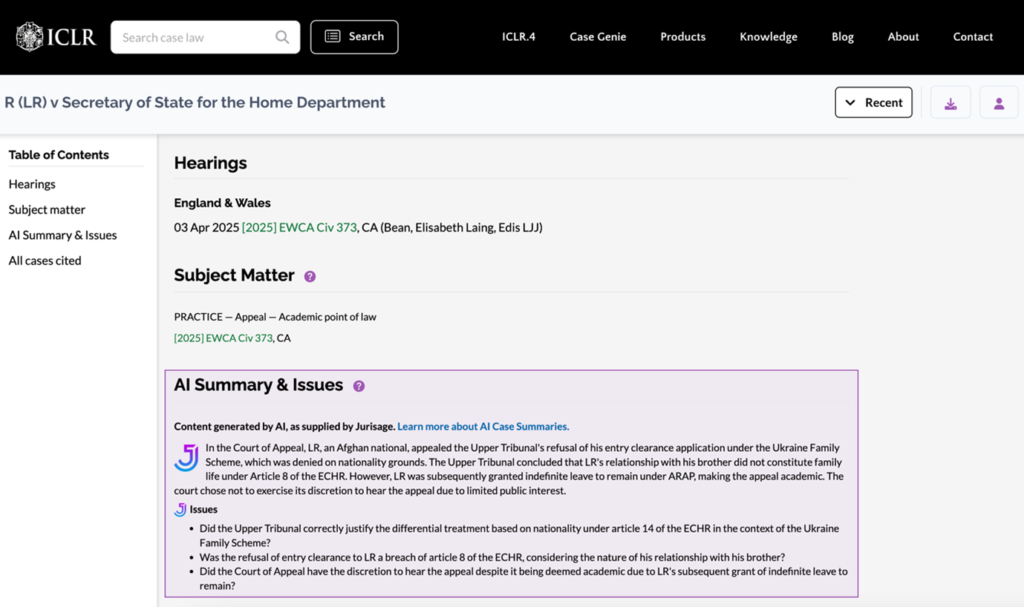
Finding the right case has never been more important but the sheer volume of published judgments, while beneficial in terms of open justice, only makes it harder than ever to locate a particular decision. ICLR’s approach to case summaries, using both AI and human expertise, provides a balanced solution.
ICLR has traditionally seen its role as the authoritative source of precedents — cases which change or clarify the common law, as opposed to those which merely apply it. Hence the virtue of the selective criteria for what we call “reportability”. It is as important not to report the vast majority of cases that really don’t add anything to the common law, as it is to report those cases that do.
That was easier in the past, when the only cases that were available were those that were reported, either for a general series like The Law Reports and the Weekly Law Reports, or for the more specialised series covering specific practice areas. ICLR and other publishers effectively acted as gatekeepers, as well as watchdogs, of the common law. Now that almost every judgment is published somewhere online, the virtue of selection is harder to maintain. Digital publication has made it cheap and easy to publish them all, and the expectations of open justice and transparency demand that we should provide free public access to all the decisions of the courts.
There is, therefore, a tension between the demand of the legal profession for the cases that matter, and that of court observers more generally, for the opportunity to hold the justice system to proper public scrutiny. But recent developments have enabled ICLR to manage the needs of all users.
Unreported cases
As announced here previously, ICLR is now providing free access to all the judgments of the courts and tribunals of England and Wales distributed by The National Archives, as well as those in English from the European Court of Justice, and tribunals such as the Competition Appeal Tribunal. For subscribers to ICLR online, there is now the added value of a short summary, generated by artificial intelligence, thanks to an arrangement with the Canadian supplier, Jurisage (now part of CiteRite).
These summaries are a straightforward and fast way to get an understanding about what the case is about – they don’t go into great detail, they do not purport to be able to accurately distinguish the legal doctrine at hand, instead they simply give a “top down” view of the case in conjunction with a handy list of issues discussed within the case. By way of example, here is the summary in the case of R (LR) v Secretary of State for the Home Dept [2025] EWCA Civ 373:
“In the Court of Appeal, LR, an Afghan national, appealed the Upper Tribunal’s refusal of his entry clearance application under the Ukraine Family Scheme, which was denied on nationality grounds. The Upper Tribunal concluded that LR’s relationship with his brother did not constitute family life under Article 8 of the ECHR. However, LR was subsequently granted indefinite leave to remain under ARAP, making the appeal academic. The court chose not to exercise its discretion to hear the appeal due to limited public interest.”
And the issues:
- Did the Upper Tribunal correctly justify the differential treatment based on nationality under article 14 of the ECHR in the context of the Ukraine Family Scheme?
- Was the refusal of entry clearance to LR a breach of article 8 of the ECHR, considering the nature of his relationship with his brother?
- Did the Court of Appeal have the discretion to hear the appeal despite it being deemed academic due to LR’s subsequent grant of indefinite leave to remain?
Since last year these AI-generated summaries have been displayed for any unreported case in the list of results after a conventional search or suggested search via Case Genie. Now the summaries and list of issues will appear in the Case Info page of any unreported case:

These summaries will only be visible to subscribers. You will need to be logged in to see them, along with certain other value-added elements of content on the Case Info (formerly known as the “Index Card”) page, such as the lists of legislation considered, and the cases cited or considered in the judgment, and the later cases which may have cited it.
Reportable cases
The AI summaries will be replaced, if and when the case is to be reported by ICLR, with our own human-generated case summary, the WLR Daily or WLR(D).
These are summaries by our law reporters of new cases which are intended be fully reported. They appear within a day or two of judgment being delivered, and are intended to provide stop-gap coverage pending the appearance of a fully reported, edited, and judicially approved case report. As part of our charitable role in supporting public legal information, ICLR has offered access to the WLR(D) case summaries free of charge and in front of the paywall since their inception in 2009.
The format of these brief reports has changed over time, but the essential elements include much of what would constitute a headnote in a full text report, including full subject matter catchwords, a statement of the factual matrix, and one or more “holdings” encapsulating the legal principles decided. Cases judicially considered by the court may also be identified. There will usually be a link to the full text of the judgment, either published on ICLR.4 or via a third party platform, such as BAILII.
The subject matter catchwords from the WLR(D) summaries will also appear on the Case Info page in front of the paywall. For logged in subscribers, they will replace the AI-generated summary.
ICLR is currently reviewing all its content offerings with a view to assessing how much of it should remain free of charge, in support of its charitable objectives, and how much should be subject to the modest subscriptions which support the specialist staff who curate and create its content. We are also looking for ways to extend our support for the legal professions as they grapple with the needs of open justice and transparency, and for the education sector, with whom we are keen to expand our sponsorship and collaboration.
Paul Magrath is Head of Product Development and Online Content at the Incorporated Council of Law Reporting for England & Wales. He is a member of the Courts and Tribunals Observers Network, and a trustee of the Transparency Project. Email paul.magrath@iclr.co.uk. Bluesky @maggotlaw.bsky.social..
Photo on Pexels by Ron Lach.